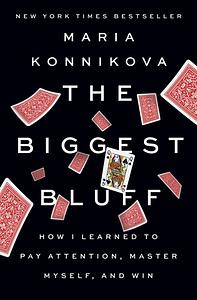Take a photo of a barcode or cover
365 reviews for:
The Biggest Bluff: How I Learned to Pay Attention, Master Myself, and Win
Maria Konnikova
365 reviews for:
The Biggest Bluff: How I Learned to Pay Attention, Master Myself, and Win
Maria Konnikova
adventurous
hopeful
informative
inspiring
medium-paced
Did this woman truly converse or spend any meaningful amount of time with literally any other poker player than her beloved Erik? I'm not going to ever find out because I could not stand this book to the point of DNFing.
funny
informative
inspiring
medium-paced
adventurous
informative
inspiring
medium-paced
funny
informative
reflective
fast-paced
informative
medium-paced
I barely know anything about poker, and I learned some interesting things. I think maybe some of the more nuanced strategy stuff would have absorbed better in my brain if I had been reading the print version instead of the audiobook, but that's a me-problem. Maria Konnikova's one of those writers where I know that, whatever she chooses to write about, it's going to be a fascinating journey.
Well-written and insightful. Was slightly disappointed reading the book itself because it didn’t really add anything to pre- and post-publication excerpts and author interviews.
This is a very philosophical and research-focused (don't mind the self-help-y subtitle) memoir based on clever premise: a PhD in psychology tries to leverage her knowledge in the game of poker.
For the first half of the book I was waiting for it to get to "the good part" where the premise would actually shine through, but as I read on it became clear that I was missing the deeper point. As the chapter "The Art of the Tell" clarifies (far too late in the book, in my opinion, but the events are quasi-chronological so I'll allow it), while there are some studies and applications of psychology to benefit the poker player, it is not so much about mastering the "mental game" but rather adopting a generally objective, academic, and flexible approach that will help you master the whole game. This is a much more fundamental and wide-reaching lesson, and the ability of this book to guide the reader along with the author to this realization is commendable.
As the twisting narrative exemplifies, however, it is easier said than done. And a lot of that seems to come from the notion of luck, another strong theme. There's an interesting tension in this book, which is the acknowledgement of all the things in life that cannot be controlled, and yet not dwelling on that fact. The chapter "No Bad Beats" has a discussion on this and ultimately concludes it is best to have a victor (as opposed to a victim) mentality: when things don't go your way--in poker and in life--to say: well, my process was correct, I just had crap luck.
It can be hard in many cases to know where skill ends and luck begins, but to the extent it is possible it is important to cordon off what you can control and focus on that. To separate the signal and the noise (side note: this book name-drops Nate Silver in the first fifty pages, and that's a lesson for future authors who want to draw me in ;)). Hard work and skill are necessary but not sufficient conditions for success. They will give you a shot, but in most "wicked" (i.e., luck-inflicted, where learning environments are clouded) endeavors that's all it gets you: a shot.
I really like the note it strikes in its last few chapters, where she meets her eventual success not with a victory lap, but with skepticism: is this really skill? It's hard to say for sure. The best we can do is become more and more confident one way or the other. The Sagan quote at the end is quite apt in this regard.
I didn't speak too much about the "plot", which was interesting no doubt, but ultimately that was not the focus. Sometimes I wished it was, and there were a few points I was disappointed the poker plays and learnings were not more detailed. I still think the book could have benefitted a bit more from that angle, but I understand why she focused the narrative the way she did. Same with the very honest, chatty, and sometimes self-effacing tone the book took in places. Not my favorite, but I understand why she wrote it that way.
Overall, excellent. 4.5 stars.
For the first half of the book I was waiting for it to get to "the good part" where the premise would actually shine through, but as I read on it became clear that I was missing the deeper point. As the chapter "The Art of the Tell" clarifies (far too late in the book, in my opinion, but the events are quasi-chronological so I'll allow it), while there are some studies and applications of psychology to benefit the poker player, it is not so much about mastering the "mental game" but rather adopting a generally objective, academic, and flexible approach that will help you master the whole game. This is a much more fundamental and wide-reaching lesson, and the ability of this book to guide the reader along with the author to this realization is commendable.
As the twisting narrative exemplifies, however, it is easier said than done. And a lot of that seems to come from the notion of luck, another strong theme. There's an interesting tension in this book, which is the acknowledgement of all the things in life that cannot be controlled, and yet not dwelling on that fact. The chapter "No Bad Beats" has a discussion on this and ultimately concludes it is best to have a victor (as opposed to a victim) mentality: when things don't go your way--in poker and in life--to say: well, my process was correct, I just had crap luck.
It can be hard in many cases to know where skill ends and luck begins, but to the extent it is possible it is important to cordon off what you can control and focus on that. To separate the signal and the noise (side note: this book name-drops Nate Silver in the first fifty pages, and that's a lesson for future authors who want to draw me in ;)). Hard work and skill are necessary but not sufficient conditions for success. They will give you a shot, but in most "wicked" (i.e., luck-inflicted, where learning environments are clouded) endeavors that's all it gets you: a shot.
I really like the note it strikes in its last few chapters, where she meets her eventual success not with a victory lap, but with skepticism: is this really skill? It's hard to say for sure. The best we can do is become more and more confident one way or the other. The Sagan quote at the end is quite apt in this regard.
I didn't speak too much about the "plot", which was interesting no doubt, but ultimately that was not the focus. Sometimes I wished it was, and there were a few points I was disappointed the poker plays and learnings were not more detailed. I still think the book could have benefitted a bit more from that angle, but I understand why she focused the narrative the way she did. Same with the very honest, chatty, and sometimes self-effacing tone the book took in places. Not my favorite, but I understand why she wrote it that way.
Overall, excellent. 4.5 stars.
informative
inspiring
medium-paced
A bit dry but interesting. A lot about how success is more about mindset and focus than actual ability.




